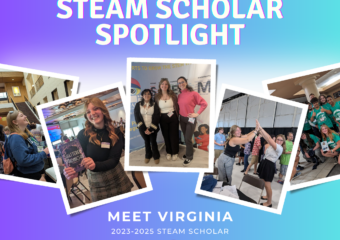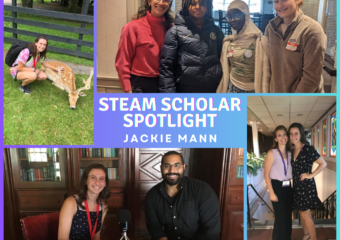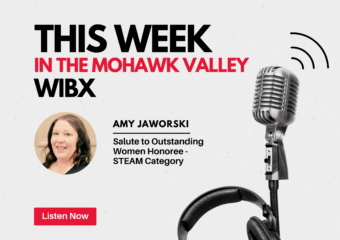ROME — Project Fibonacci is now accepting nominations of students ages 14 to 19 to attend its fifth annual STEAM Youth Leadership Conference in July — for students interested in science, technology, engineering, arts and mathematics, according to the Project Fibonacci Foundation.
Nominations are being accepted through July 1 for eligible students who turn 14 to 19 years old this year. Nominees must express or demonstrate an interest in STEAM leadership education and entrepreneurship, and be enrolled as full-time students. Certificated homeschool students and students in vocational trade programs are also eligible.
Nominations can come from schools, businesses, parents, mentors or extracurricular clubs or organizations.
The conference will take place from July 23 to 29, and will be hosted at Rome Free Academy and several other venues at the Griffiss Business and Technology Park, including Mohawk Valley Community College and the Innovare Center. There are also multiple field trips scheduled for the week to local science and art facilities in the Mohawk Valley.
Students and guests will stay at the Hampton Inn hotel at Griffiss Park during the week.
There is an all-inclusive $1,500 registration fee that will cover meals, lodging, transportation, educational materials, speakers, medical and security services. There are several tax-deductible sponsorship programs and scholarships available to help afford the registration fee, officials said. Attendance is limited to 100 students and officials said that available slots are expected to fill quickly.
“After nearly three years, there is a strong desire to return to pre-pandemic normal. Conferences and symposia are slowly pivoting more and more toward a live, in-person format with options for virtual attendance,” according to Andrew Drozd, foundation chairman.
“The STEAM leadership conference is an event for high school through first-year college students seeking to define their career path, including those who aspire toward the vocational trades.”
This is the first such Project Fibonacci conference since the COVID-19 pandemic.
The theme of this year’s conference is “Adapting to Climate Change: Sustaining our Planet, its Oceans and Global Population.”
Keynote speakers during the week will include Bruce Rosenbaum of Modvic Studios in Massachusetts, an expert in Janusian Steampunk artistry; and Robert Pflugfelder, known for his television appearances as “Science Bob.”
The conference activities will be kicked off by Robert Hazen, who is a scientist, mineralogist, senior lead at the Carnegie Institute’s Geophysical Laboratory, and professor emeritus at George Mason University. He will discuss his multidisciplinary Deep Carbon Observatory (DCO) and their work investigating carbon’s role in global warming; Hazen is executive director of the DCO. He authored more than 350 articles and 20 books on science, history, and music and a veteran STEAM scholar. His appearance is being sponsored thanks to the generous support of Jim and Anita Dulak.
Opening talks and workshops on Janusian Steampunk artistry will be given during the week by Rosenbaum. Beyond the art itself, the Janusian method reimagines how technologies of the past can be repurposed to solve present and future technological problems, such as building renewable energy machines. Drozd stated, “The Janusian method defines the entanglement between art and science, past and future — the way nature, the cosmos, and intelligent powers in the universe intended.”
The foundation is pleased to host a mid-week keynote talk by ABC Good Morning America’s chief meteorologist, Ginger Zee. She is a best-selling author, climate activist, mental health advocate, and ballroom dance competitor on Season 22 of ABC’s “Dancing With the Stars.” Zee will talk about her travels to various parts of the world to study biological ecosystems impacted by climate change. Her appearance is sponsored in part by the Shoreline Group and a local charitable foundation.
Back by popular demand, Robert Pflugfelder, also known as “Science Bob” — a television personality, educator, author and science presenter previously featured at the 2019 STEAM conference — will give an entertaining series of science demonstrations on the last full day of the conference. He is often seen on the Jimmy Kimmel show, “Live with Kelly & Ryan,” and Nickelodeon.
Climate-change-themed workshops are planned that will cover relevant topics on the use of Artificial Intelligence (AI) in sustainable agriculture; quantum computing for climate change analytics and predictive modeling; novel waste management to rehabilitate landfills and our oceans; carbon capture techniques; ethical considerations in interpreting scientific data, carbon taxation, and the growing role of AI amidst the recent surge in popularity of Chat bots like CHATGPT; and much more.
Other STEAM workshops will highlight how artistic creativity can spur technological innovation, scientific understanding, and how this strategy can help in STEM problem solving and addressing socio-technological challenges in our times, such as climate change adaptation.
A special focus will be on exploring the relationships between the art of music and the science of sound. According to Drozd, several workshops will delve into the interplay of mathematics, music, and other art forms in STEM problem solving tasks. Drozd often cites real-world examples where the arts have played an integral role in STEM solutions. “The ‘M&M’ factor — where musicians and mathematicians collaborate to solve STEM problems from two seemingly opposite but highly complementary perspectives — serves as an excellent example. M&M teams were at the core of code- breaking efforts in the South Pacific during World War II. Modern cyber coding practices are based on similar methods,” stated Drozd.
A workshop by Mark Radlowski, MVCC emeritus professor and administrator, will present The Wonders of Origami, which will explore the history, culture, and math behind an ancient art form and why it is relevant today in understanding and solving STEM challenges.
Other workshops will tease out the subtle mechanisms of communication using rhythmic drumming and vocal and instrumental harmonies built on mathematical patterns that can influence learning capacity and personal creativity.
Read the full Daily Sentinel story here




